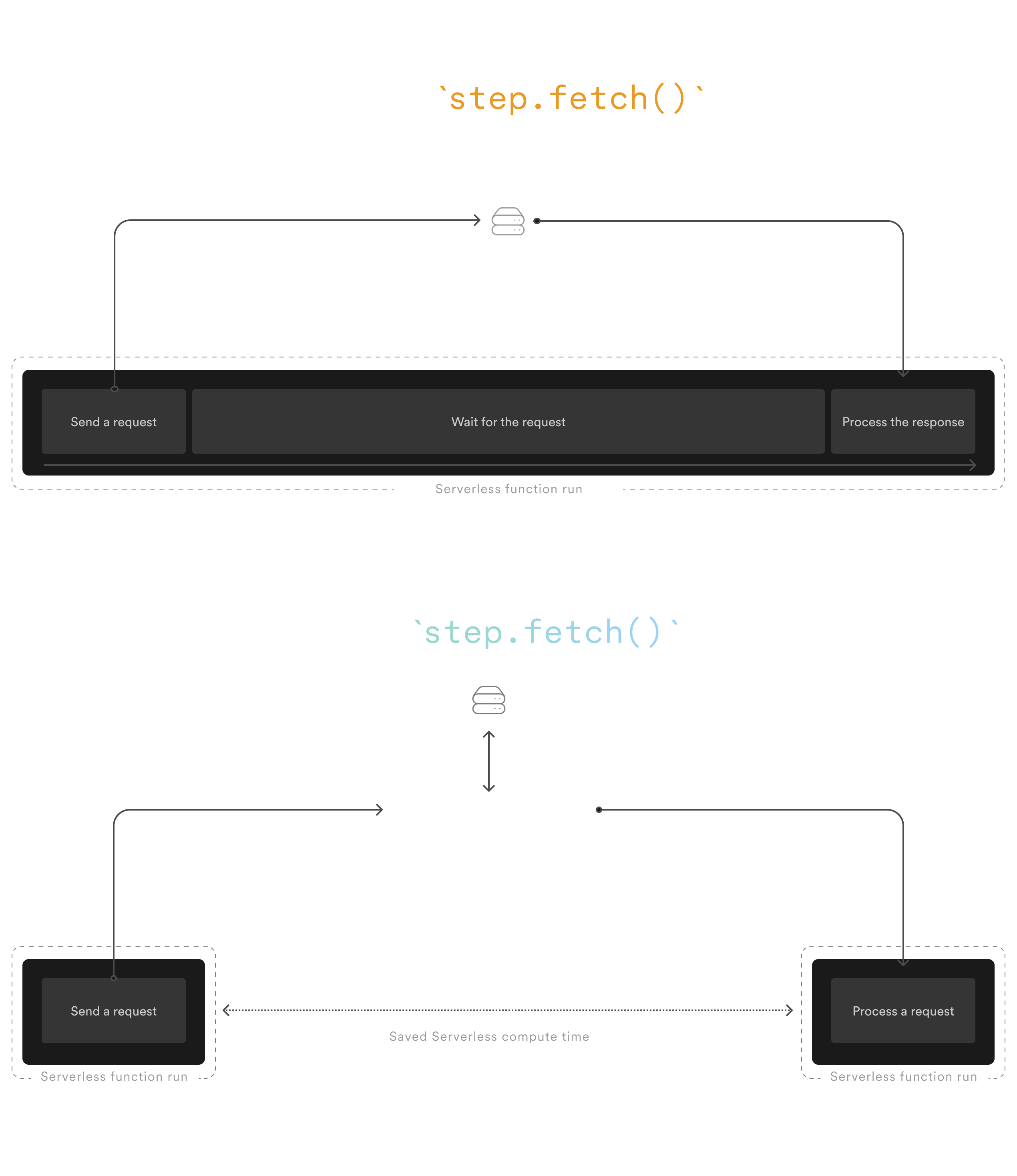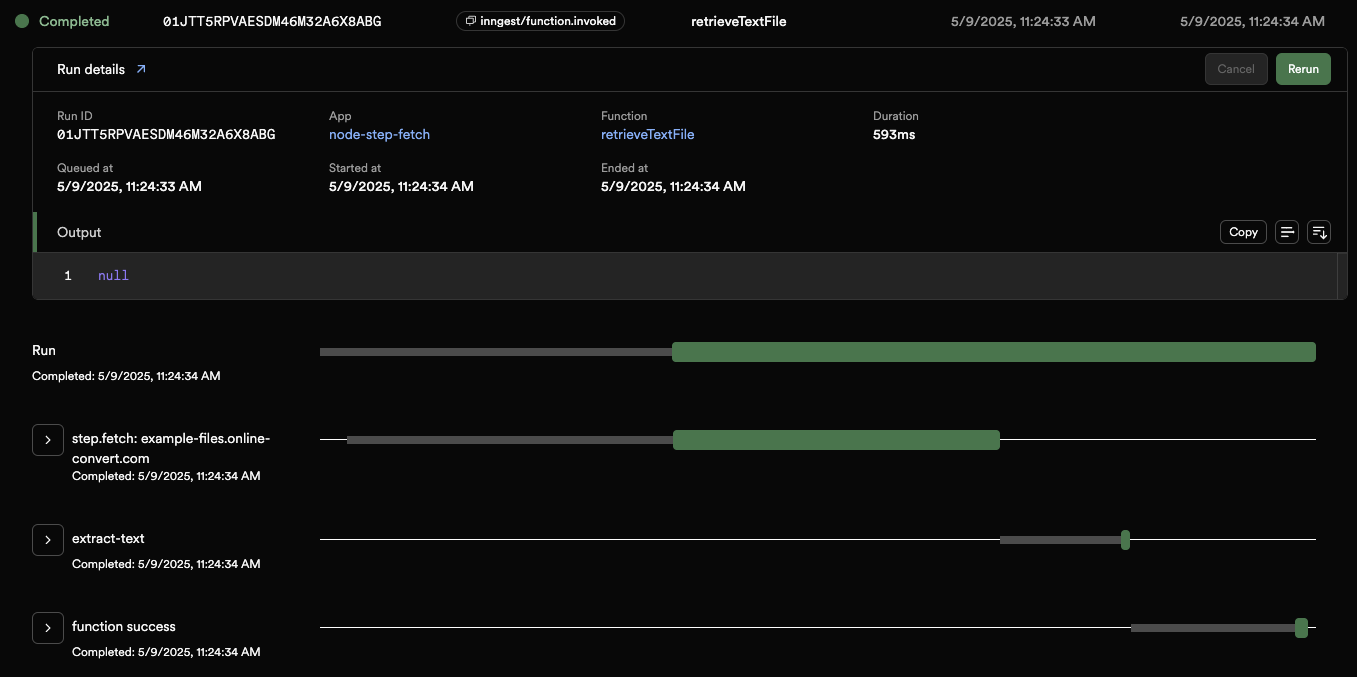
Introducing: step.fetch()
Offload HTTP requests to the Inngest Platform to save compute and improve reliability.
Charly Poly· 5/9/2025 · 3 min read
We are thrilled to release Fetch, a set of new APIs to make durable HTTP requests within an Inngest function.
Now available in our TypeScript SDK, the step.fetch() API and the fetch() utility enable you to make requests to third-party APIs or fetch data in a durable way by offloading them to the Inngest Platform.
Dealing with third-party API requests and data fetching comes with its set of challenges, from handling rate limits to ensuring reliability and managing slow response times. While Inngest Flow Control features such as Throttling or Concurrency help with the first two, the Fetch APIs now close the loop with a simple way to make all HTTP requests durable and performant on any compute platform.
const processFiles = inngest.createFunction(
{ id: "process-files" },
{ event: "files/process" },
async ({ step }) => {
// The request is offloaded to the Inngest Platform
const response = await step.fetch("https://api.example.com/files", {
method: "GET",
headers: {
"Authorization": `Bearer ${process.env.API_KEY}`
}
})
// Your Inngest function is resumed here with the response
await step.run("process-file", async (file) => {
const body = await response.json()
// body.files
})
}
)
Both APIs offload the HTTP request to the Inngest Platform, freeing up more capacity for your service to handle other incoming requests:

step.fetch() in a nutshell
The new step.fetch() API brings all the benefits of step.run() with the added advantage of offloading the HTTP request to the Inngest Platform, saving you compute and removing potential serverless timeout issues.
As part of the step API, step.fetch() is also compatible with the Promise API, enabling you to perform multiple requests in parallel and use the Promise.all() API to speed up your functions:
const processFiles = inngest.createFunction(
{ id: "process-files", concurrency: 10 },
{ event: "files/process" },
async ({ step, event }) => {
// All requests will be offloaded and processed in parallel while matching the concurrency limit
const responses = await Promise.all(event.data.files.map(async (file) => {
return step.fetch(`https://api.example.com/files/${file.id}`)
}))
// Your Inngest function is resumed here with the responses
await step.run("process-file", async (file) => {
const body = await response.json()
// body.files
})
}
)
All step.fetch() (and fetch() helper) calls appear in your Inngest Traces, improving observability and helping you debug issues with your HTTP requests:

The fetch() utility: make 3rd party library HTTP requests durable
The Fetch APIs also expose a fetch() utility that works exactly like the native fetch() API but is compatible with the step.fetch() API.
For example, you can pass the fetch() utility to the OpenAI node client as follows:
import { fetch } from "inngest";
import OpenAI from 'openai';
const client = new OpenAI({ fetch });
// use the global fetch
const completion = await client.chat.completions.create({
model: "gpt-3.5-turbo",
messages: [{ role: "user", content: "Hello, world!" }],
});
const weatherFunction = inngest.createFunction(
{ id: "weather-function" },
{ event: "weather/get" },
async ({ step }) => {
// The OpenAI request is automatically offloaded to the Inngest Platform
const completion = await client.chat.completions.create({
model: "gpt-3.5-turbo",
messages: [{ role: "user", content: "What's the weather in London?" }],
});
}
)
Get started
Inngest's fetch() and step.fetch() APIs are available in our TypeScript SDK.
Get started by reading the Fetch documentation and by checking out the examples.
step.fetch() is a unique feature that tackles complex use cases while improving the developer experience. Take a look and participate in our roadmap as we continue to push the limits of Inngest's APIs!